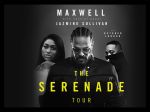With six days left in what polls show to be a neck-and-neck mayoral election, Gene Locke and Annise Parker sparred Sunday in a feisty final debate that may be a harbinger of a tense week ahead.
The candidates were vying for the attention of the estimated 18 percent of voters who are still undecided before Saturday’s vote, according to a poll conducted last week by Zogby International.
The poll gave Parker a 5.5-percentage-point lead over Locke. But experts said results from Sunday’s debate — hosted by KHOU-TV and co-sponsored by KUHF radio and the Houston Chronicle — weren’t as decisive.
“Nobody got a knockout punch,” said Rice University political scientist Bob Stein.
A disproportionate number of the voters still up for grabs are white Republicans who voted for Roy Morales, the lone Republican in the general election, Stein said.
A new block of voters who didn’t come out for the general election but have begun casting early ballots in the runoff are also being wooed, Stein said. Those voters tend to be white westside residents older than 65.
Parker reached out to those voters at Sunday’s debate by focusing on her fiscal conservatism and by emphasizing Locke’s past as a lobbyist, Stein said. In turn, he said, Locke targeted the same voters by making public safety his top agenda item.
Candidates took questions from a panel and were given a chance to ask each other two questions during the debate.
Parker, the city controller, held Locke’s feet to the fire over his endorsement by an anti-gay activist, and did not defend him when asked whether she believed he was behind a vitriolic mailing from another anti-gay activist.
Locke battled Parker on misleading information in some of her political ads: one in which she claimed the support of Houston police unions (she does have the support of the Houston Police Patrolmen’s Union, but not the much-larger Houston Police Officers Union, which endorsed Locke) and another claiming that Locke, the former city attorney, was responsible for a legal ruling that cost the city $22 million (the ruling was overturned, and the city did not have to pay).
“Don’t you think it’s time to come clean and stop those ads that you’re running?” Locke asked his opponent.
“Mr. Locke, a federal judge called your behavior appalling and unprofessional,” Parker shot back. “The fact that it was overturned on appeal should not be something you would take pride in.”
Parker criticized Locke for accepting the endorsement of Steven Hotze, a vocal anti-gay activist, when other candidates renounced Hotze’s endorsement. Locke said he would accept support from anyone as long as it was because of his qualifications for mayor, and not because of bigotry.
In response to a question about whether she thought Locke was behind a mailing from anti-gay activist Dave Wilson, which asked Houstonians not to vote for Parker because she is a lesbian, Parker declined to comment directly.
“That question should more properly be asked of Mr. Locke,” she said.
Locke denied involvement with the mailing.
“I’d like to at least get a recognition from my opponent that I’ve tried to keep this campaign on issues that relate to the city of Houston,” he said. “I’m extremely disappointed that her campaign has at least insinuated I was a part of it.”
Both candidates deflected some questions in favor of restating their campaign platforms and finding fault with the other.
Locke did not give details on his pledge to put more police on the streets by giving a number, a time frame or a funding source. Parker shrugged off the question about fostering the impression that she had been endorsed by the Houston Police Officers Union by calling the criticism “election rhetoric.”
Via: Chron.com











